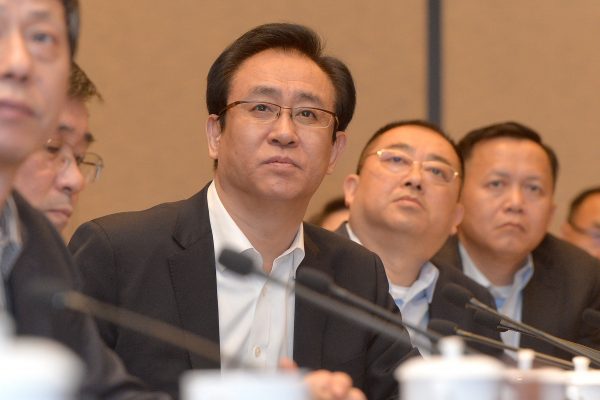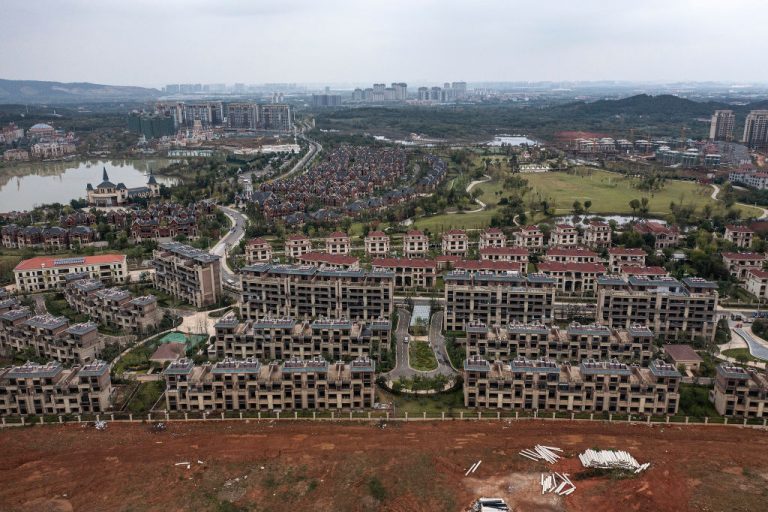China’s Evergrande Group, with on the books liabilities in excess of US$300 billion is on the brink of collapse. It’s collapse would have disastrous and far reaching consequences for both the Chinese economy and the global economy at large.
Faced with this reality, it appears as though Beijing, behind the scenes, has stepped in to coordinate a systematic dismantling of the developer in an attempt to avoid a worst case outcome.
“The plan, according to people familiar with the matter and the official government statements, is to manage a controlled implosion by selling off some Evergrande assets to Chinese companies while limiting damage to home buyers and businesses involved in it’s projects,” the Wall Street Journal (WSJ) reported.
A priority for Beijing is to address Evergrande’s hundreds of stalled projects that span some 200 cities. In the most likely scenario, many of these projects will be handed over to smaller developers to complete.
With direction from Beijing, task forces have been set up in numerous cities where Evergrande has active projects to help manage the process of distributing stalled projects to other developers for completion, people familiar with the matter say.
Success
You are now signed up for our newsletter
Success
Check your email to complete sign up
In addition, local authorities have been ordered to employ accountants to examine Evergrande’s finances and to establish law-enforcement teams to manage any public fallout and discontent.
Evergrande has presold more than a million apartments that, to date, remain unfinished and has already collected money from buyers. Failing to deliver finished products after collecting money from buyers would undermine confidence in the housing market. Home buyers and investors alike are at risk of suffering painful losses.
In China, where real estate contributes roughly 25 percent to the country’s economic activity, any major shock to the real estate industry would inevitably have a detrimental effect on China’s gross domestic product (GDP).
READ MORE: Chinese Property Companies Hit With Credit Downgrades as Evergrande Crisis Deepens
In another example of state intervention Evergrande has been required to transfer revenues from unfinished homes to escrow accounts overseen by government authorities, according to The WSJ and Chinese media.
Some of this money, sitting in escrow, is being distributed to suppliers so that construction can continue. Evergrande is required to submit applications to the government in order to gain access to and disburse the funds.
An employee of Shenyang Landscape CO., a landscaping firm told the WSJ “We are gradually receiving payments either from Evergrande or from accounts overseen by the government,” adding that work has resumed in some cities.
People familiar with the matter have said that for projects that were not far along in the construction process local governments have told Evergrande to cancel the projects entirely and to return any payments received to home buyers while authorities talk to other smaller developers about taking over the land the cancelled projects were slated to be developed on.
“In Zhejiang province, a country-level government made Evergrande pay back over 50 million yuan, or around $7.8 million, in full refunds to more than 200 owners of unbuilt homes,” the WSJ reported.
Interventions not working across the board
Beijing’s interventions appear to be working in some cities while others are mired in confusion. Suppliers in many cities are saying that they’re still waiting for payment with some companies filing claims against the developer in local courts in a bid to collect.
People familiar with the matter are saying that Evergrande may allow companies to take over unfinished apartments as payment in kind.
Other companies, like Suzhou Gold Mantis Construction Decoration Co. have millions of dollars in unpaid invoices and are reportedly working with Evergrande to resolve the payment issues however stated in a recent regulatory filing that there was “significant uncertainty” concerning how or even if, Evergrande would settle its debts. Some suppliers and contractors have said that they have stopped accepting work from Evergrande.
Compounding the problem is that home buyers, who have recently taken possession of “finished” Evergrande homes, are reporting defects such as unfinished interiors and gas and water leaks, according to complaints posted on government websites and social media.

Evergrande scrambles to raise funds
Evergrande has been frantically trying to raise funds to lighten its financial burdens and manage its liabilities after a bid to sell off a major stake in its property management division fell through last month. Had the deal been successful Evergrande would have been able to raise approximately US$2.6 billion.
In September, Evergrande was urged by Chinese financial regulators to sell close to 20 percent of its stake in state-owned Shengling Bank Co. and was quick to strike a deal. Additionally, the company has sold some of their property units to suppliers and contractors in an attempt to settle billions of dollars worth of outstanding payments.
Evergrande is looking everywhere in an attempt to raise funds including selling two private jets in a deal estimated to be worth US$50 million and divesting shares in an online media company reportedly valued at around US$145 million.
The company was also successful in selling off a stake it had in a Hong Kong residential project named “The Vertex.” Employees for Evergrande were instructed to exit the project after the deal was completed, according to conversations reviewed by the WSJ.
Evergrande’s billionaire founder, Hui Ka Yan was even encouraged to use his personal wealth to pay down debts of the company.
READ MORE: Beijing Asks Evergrande Founder to Use His Money to Pay Back Company Debts
A home grown crisis
Had Beijing not imposed new rules last year known as the “three red lines” Evergrande may very well have been in the position to continue amassing tremendous debt while operating “normally.”
The “three red lines” were predicted to drive a wave of credit reratings for developers which is exactly what happened to a number of property developers in China.
The three red lines limit a developers liability-to-asset ratio to less than 70 percent, legislated a net gearing ratio of less than 100 percent and limited a companies cash-to-short-term debt ratio to no more than 1 times.
The new rules heavily impacted Evergrande which had borrowed immensely to diversify into a smorgasbord of businesses including healthcare, bottled water, theme parks and electric vehicles.
While Evergrande has recently been successful in making some payments on bonds shortly before the end of its 30-day grace periods, there are several more payments coming due in the months to come and there is not much confidence Evergrande will be in the position to fulfill its obligations.
READ MORE: Chinese Real Estate giant Evergrande Narrowly Avoids Another Default
Officials involved in Evergrande’s dismantling believe that they have sufficient resources to pull it off without triggering dire consequences for the Chinese real estate market; however a single misstep could prove dire.
As the crisis unfolds, new home sales are plummeting as buyers wait and see how things progress and Chinese developers are seeing a huge spike in the selloff of their bonds. Many developers have either defaulted on obligations or asked investors to wait for repayment. The credit market has made it near impossible for them to sell any new bonds eliminating a key tool developers had to raise funds and to support cash flow.
Chinese authorities now have to contend with another consequence of Evergrande’s looming collapse and that is of cratering property values which has a direct impact on China’s GDP. In response, local governments have scrapped curbs on mortgages and have extended subsidies to home buyers to prevent home prices from declining even more.














